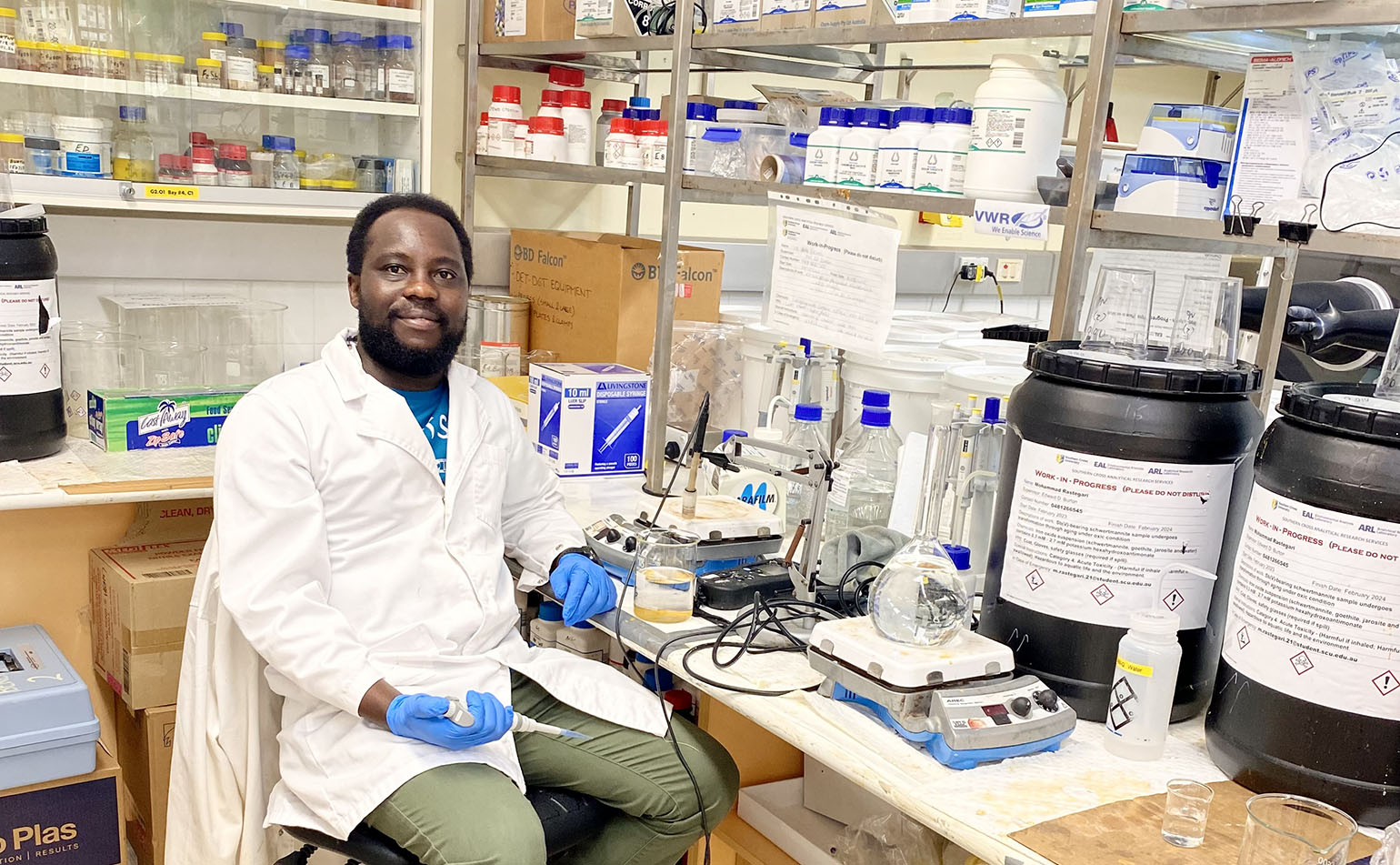Hailing from Uganda, Henry Luutu first visited Australia in 2014 after finishing his undergraduate degree. It was this visit, and a passion for sustainable agriculture, that inspired his return in 2019 to pursue postgraduate studies at Southern Cross University.
“During this trip I had an opportunity to observe a number of farms practicing conservation tillage in Queensland’s Darling Downs,” Henry enthused. “I also got a glimpse of the beautiful Australian landscape as I journeyed from Brisbane to Tamworth.”
Henry’s desire to contribute his knowledge and skills towards solving the challenges of increasing global waste production, deteriorating soil health and unsustainable food production systems, is what led him to his PhD with the Soil CRC.
“This desire was nurtured during my undergraduate Science degree (majoring in Horticulture Science) at Makerere University in my home country of Uganda,” he said.
Henry’s PhD project offers potential solutions to the critical challenges presented by low soil productivity, waste disposal and climate change. Titled ‘Phytotoxicity and ecotoxicology of hydrothermal carbonisation – treated wastes’, his research investigated the effect of soil-applied hydrothermal carbonised wastes on plants and soil organisms.
“Hydrothermal carbonisation converts high moisture biomass into hydrochar, a carbon material with substantially lower energy inputs compared to pyrolysis (heating in the absence of oxygen),” he explained.
“Hydrochar can improve soil physical properties, avail nutrients, and is a potential material for carbon sequestration. However, results of hydrochar addition to soils have been inconsistent, with positive, negative, and even no effect reported on plant growth and soil organisms.”
Henry said his findings indicate that hydrochar produced at a low reaction temperature (200°C) enhances soil performance, due to improved microbial functioning. However, at high reaction temperature, it may be toxic to plants and it might also create an unfavourable habitat for earthworms.
“Nevertheless, I have demonstrated that this toxicity can easily be eliminated by post-treatments, like hydrochar aging for 30 days or post-pyrolysis, which allows hydrochar to benefit the soil,” he said.
With Henry’s PhD project now complete, the findings of his research can be used to inform decisions on sustainable use of hydrochar and optimise its benefits.
When asked what he valued most about his PhD experience, Henry highlighted the mentorship from his supervisors. “The support I’ve received from my supervisors, Professor Terry Rose, Dr Shane McIntosh, Professor Andrew Rose, Associate Professor Michael Rose and Dr Lukas Van Zwieten, has been immeasurable,” he said.
“I also really value being part of the Soil CRC PhD cohort – it’s an opportunity I truly treasure. The annual Soil CRC Participants Conference, where I got to connect with people from academia, the private sector, policy makers and fellow PhD students in Australia, is another experience I have really enjoyed.”
Henry will submit his thesis this month, and said he is ready for a new challenge. “I’m keen to take on a post-doctoral position and I’m particularly interested in continuing research to develop novel material for soil amendment,” he said.
And who wouldn’t want to work with Henry? Known by his research colleagues for his big smile and infectious laugh, he credits his positive outlook for helping him and others through challenging times – from completing a large part of his PhD during COVID lockdowns to first-hand experience of last year’s devastating Lismore floods.
“I’ve been told that I smile and laugh a lot!” Henry said. “It’s an important part of keeping my mental health in check and making my workplace and my home a happy place to be.”
Find out more
Read Henry’s recent journal publications:
- Luutu, H., Rose, M.T., McIntosh, S. et al. Plant growth responses to soil-applied hydrothermally-carbonised waste amendments: a meta-analysis. Plant Soil 472, 1–15 (2022). https://doi.org/10.1007/s11104-021-05185-4
- Luutu, H., Rose, M.T., McIntosh, S. et al. Phytotoxicity induced by soil-applied hydrothermally-carbonised waste amendments: effect of reaction temperature, feedstock and soil nutrition. Plant Soil (2023). https://doi.org/10.1007/s11104-023-06265-3
Watch Henry’s presentation at the 2023 Soil CRC Participants Conference

